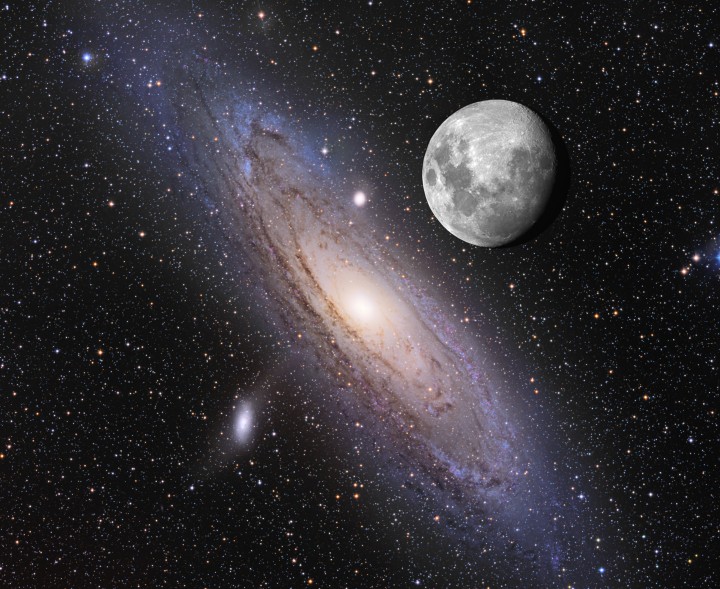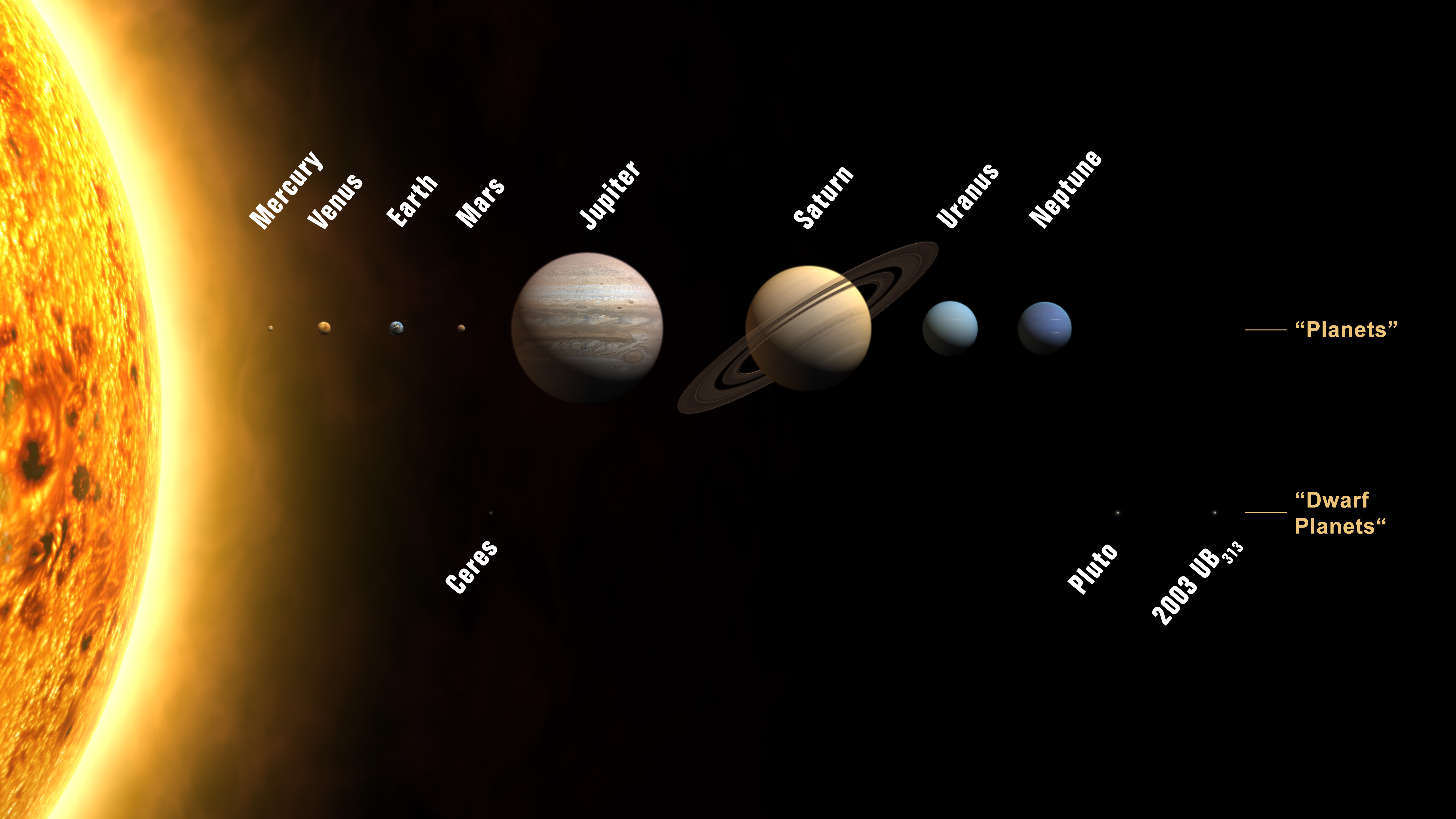Just out of curiosity
-
Victor J. Chavez
- Asternaut
- Posts: 2
- Joined: Fri Feb 16, 2007 3:04 pm
Just out of curiosity
Has anyone ever assembled a collage of the sky showing features and there relative sizes? I was struck by a recent photo explanation indicating that Andromeda is twice the width of the moon in the sky.
I think it would be stunning to create such a photograph so that people on the edge of the world of astronomy would realize what is out there. I realize that it would have to include a combination of sources such as infra red, x-ray, visible etc. etc. but wouldn't it be stunning?
I think it would be stunning to create such a photograph so that people on the edge of the world of astronomy would realize what is out there. I realize that it would have to include a combination of sources such as infra red, x-ray, visible etc. etc. but wouldn't it be stunning?
-
harry
- G'day G'day G'day G'day
- Posts: 2881
- Joined: Fri Nov 18, 2005 8:04 am
- Location: Sydney Australia
Hello Victor
Maybe this link may help you
http://chandra.harvard.edu/photo/2006/n5746/
http://www.spacetelescope.org/videos/archive/viewall/
If you need more info just let me know.
Maybe this link may help you
http://chandra.harvard.edu/photo/2006/n5746/
http://www.spacetelescope.org/videos/archive/viewall/
If you need more info just let me know.
Harry : Smile and live another day.
-
Victor J. Chavez
- Asternaut
- Posts: 2
- Joined: Fri Feb 16, 2007 3:04 pm
Thanks for the links. Great photos.
Not quite what I am looking for. Maybe that is because I don't know how to ask.
I will take another run at it. The Andromeda galaxy covers twice the width of the moon in the sky. Until this was mentioned in a previous Picture of the Day, I thought it was a little prinpick of light that needed a magnifier to see. It turns out it just needs a lot more light gathering capacity. Other photos in the catalogue need different frequencies to see it and some need great magnification.
What I am wondering is, has anyone assembled these photos from available resources to create a picture of the sky that contain all of these impressions?
Hope that makes more sense.
Thanks
Not quite what I am looking for. Maybe that is because I don't know how to ask.
I will take another run at it. The Andromeda galaxy covers twice the width of the moon in the sky. Until this was mentioned in a previous Picture of the Day, I thought it was a little prinpick of light that needed a magnifier to see. It turns out it just needs a lot more light gathering capacity. Other photos in the catalogue need different frequencies to see it and some need great magnification.
What I am wondering is, has anyone assembled these photos from available resources to create a picture of the sky that contain all of these impressions?
Hope that makes more sense.
Thanks
I recently stumbled across a student work of Andromeda backdropped to the moon and someone driving along a highway (I think the size ratios was proper). But, I can't seem to find it again.Victor J. Chavez wrote:Thanks for the links. Great photos.
What I am wondering is, has anyone assembled these photos from available resources to create a picture of the sky that contain all of these impressions?
Hope that makes more sense.
I'm not sure what the proper ratio for moon/andromeda is, since our atmosphere can distort the perceived size.
There was a recent post on APOD, 2006 des.28, giving an example: Moon Over Andromeda

... my favourite is this one ...

Ckam linked this in another thread
a nice size comparison
http://youtube.com/watch?v=yvNhw888XmM& ... ed&search=
a nice size comparison
http://youtube.com/watch?v=yvNhw888XmM& ... ed&search=
- orin stepanek
- Plutopian
- Posts: 8200
- Joined: Wed Jul 27, 2005 3:41 pm
- Location: Nebraska
You tube has more of them. here's another.
http://youtube.com/watch?v=YL4cFjmnQT8& ... ed&search=
Orin
http://youtube.com/watch?v=YL4cFjmnQT8& ... ed&search=
Orin
Orin
Smile today; tomorrow's another day!
Smile today; tomorrow's another day!
the one I linked to had quick zoom-back in the end, afair ?BMAONE23 wrote:Ckam linked this in another thread
a nice size comparison
http://youtube.com/watch?v=yvNhw888XmM& ... ed&search=
I've always liked this for a sense of scale:
http://xs511.xs.to/xs511/07042/universe5py.gif
I'm afraid there are no pretty pictures, just a logarithmic graph that has the distances to essentially everything of interest in the Universe, from the centre of the Earth right to the CMB, then to the final comoving future visibility limit.
Click on it to get it in all its glory. It looks great when printed on 4-5 A4 sheets and stuck on a wall, well at least to a Astronomer like me.
http://xs511.xs.to/xs511/07042/universe5py.gif
I'm afraid there are no pretty pictures, just a logarithmic graph that has the distances to essentially everything of interest in the Universe, from the centre of the Earth right to the CMB, then to the final comoving future visibility limit.
Click on it to get it in all its glory. It looks great when printed on 4-5 A4 sheets and stuck on a wall, well at least to a Astronomer like me.
-
harry
- G'day G'day G'day G'day
- Posts: 2881
- Joined: Fri Nov 18, 2005 8:04 am
- Location: Sydney Australia
Hello All
Astro gave this link
http://xs511.xs.to/xs511/07042/universe5py.gif
The image assumes that the Big Bang theory is a fact by stating that the first stars are the furthest.
It assumes man's role as the centre.
Some more interesting reading: Just because I post these links does not mean I agree with the.
http://thunderbolts.info/tpod/2004/arch ... igbang.htm
http://thunderbolts.info/tpod/2005/arch ... igbang.htm
http://thunderbolts.info/tpod/2006/arch ... luster.htm
http://thunderbolts.info/tpod/2004/arch/040914star.htm
http://thunderbolts.info/tpod/2005/arch ... 1sofar.htm
http://thunderbolts.info/tpod/2005/arch ... sspace.htm
http://thunderbolts.info/tpod/2005/arch ... cetemp.htm
http://thunderbolts.info/tpod/2006/arch ... cience.htm
Astro gave this link
http://xs511.xs.to/xs511/07042/universe5py.gif
The image assumes that the Big Bang theory is a fact by stating that the first stars are the furthest.
It assumes man's role as the centre.
Some more interesting reading: Just because I post these links does not mean I agree with the.
http://thunderbolts.info/tpod/2004/arch ... igbang.htm
http://thunderbolts.info/tpod/2005/arch ... igbang.htm
http://thunderbolts.info/tpod/2006/arch ... luster.htm
http://thunderbolts.info/tpod/2004/arch/040914star.htm
http://thunderbolts.info/tpod/2005/arch ... 1sofar.htm
http://thunderbolts.info/tpod/2005/arch ... sspace.htm
http://thunderbolts.info/tpod/2005/arch ... cetemp.htm
http://thunderbolts.info/tpod/2006/arch ... cience.htm
Astronomer Halton Arp has called it “science by news release,” and some of the most disturbing examples come from statements “confirming” the validity of the Big Bang.
Many critics of modern theories in the sciences have noticed that science editors (newspaper, magazine, and television) appear to have lost the ability to separate fact from theory. When discussing the trademarks of popular cosmology, such as the Big Bang, the science media incessantly report that new discoveries confirm them—even when such reports are far from the truth.
One reason for this pattern is simply the momentum of archaic beliefs. But it is also apparent that good news is essential to the funding of exotic projects.
At the heart of conventional cosmology lies the dogma of an electrically neutral universe governed by gravity alone. Without the benefit of this dogma, the Big Bang hypothesis could never have achieved its present prominence. And it is here that we see most clearly how, under the necessities of funding, scientists are eager to “confirm” a theory that, according to many critics, has already failed. Editors, in turn, desiring to retain valued relationships with the spokesmen for established science, only rarely dig deeper than the latest news release delivered to them.
Harry : Smile and live another day.
harry,
Please do not post anything from the thunderbolts website, here in NSL, unless you are either prepared to
* defend the material, in terms of its scientific content, or
* show that it is based on, and consistent with, papers published in the appropriate, peer-reviewed journals.
As I said elsewhere, the scope of this site is clear - This is a scientific forum. Please stay within this clear, explicit, scope.
Please do not post anything from the thunderbolts website, here in NSL, unless you are either prepared to
* defend the material, in terms of its scientific content, or
* show that it is based on, and consistent with, papers published in the appropriate, peer-reviewed journals.
As I said elsewhere, the scope of this site is clear - This is a scientific forum. Please stay within this clear, explicit, scope.